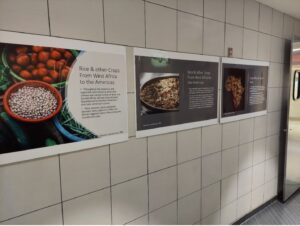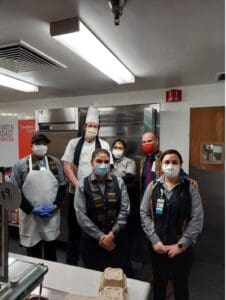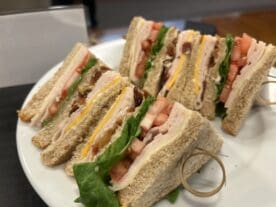Telling Stories Through Food: History and Culture in Hospital Dining
Food plays an important role in history. For centuries innovative minds have created delicacies for inquisitive palates. At the root of our culture, food can bring back memories and elicit strong emotions. It has the power to bring people together and tell stories.
That’s what happened at Adventist Health Bakersfield in Bakersfield, Calif. Through the leadership of Angela Newton, senior director of Food and Nutrition Services, the hospital is using food as a way to teach history and expand cultural knowledge.

As a registered dietitian, Newton has always embraced food as a tool for healing. She’s also found it to be a vehicle to promote awareness and broaden horizons. In particular, she embraces her Haitian descent through Caribbean cuisine’s flavors and is proud to share those flavors with new audiences.
“Food is personal for me,” Newton said. “It can be culturally significant for each of us. We are made up of an extensive quilt of people and cultures throughout the world. Through food, we can provide insight into what the experience was like for our ancestors.”
To celebrate Black History Month, Newton worked with the Morrison Healthcare and Adventist Health Bakersfield teams to develop a program that shined a light on black history in America and the importance of food in the American experience. Executive Chef Matthew Paine is passionate about teaching the ‘why’ behind the food. He embraced the challenge of creating a menu that told a story through authentic flavors.
The two-day celebration provided Adventist Bakersfield’s staff with access to new dishes that many diners had never experienced. Along with the food, the team put together a presentation that depicted each dish’s history and cultural significance.
“It seemed natural to do this,” Newton said. “Throughout history, we’ve placed importance on who we invite to our table. This is us inviting everyone to our table to experience the cultural roots of West African cuisine.”
Celebrating African, Caribbean, and American Regional Cuisine
 The first day focused on West African and Caribbean cuisine. The second day looked at American regional food, such as Creole and Gullah dishes.
The first day focused on West African and Caribbean cuisine. The second day looked at American regional food, such as Creole and Gullah dishes.
“We included history beyond the American shores. We are chasing threads back to the diaspora in Africa. A lot of the foods that we eat came from those origins.”
Through this, Newton was excited to see the Bakersfield staff’s reaction, particularly the surprise on their faces when they experienced a new flavor or realized the depth of the story behind the food. While putting the program together, Newton found inspiration and learned a few things as well.
“I wasn’t aware of the religious and cultural implications of food across the west African coast. It was important for our forefathers, and they took that with them when they were brought to America.”

The program has been a massive success for the hospital, serving as a unique way to celebrate Black History Month and to delve into the rich history of the food surrounding the culture. Newton sees a path forward for everyone to grow and better understand each other’s perspectives through learning and experience.
“The whole idea comes from an objective I have for the community and hospital. I want to teach the broader community about the power of food and its history. I’m a registered dietitian. I can’t help wanting to teach people.”
It’s a concept that they will continue at Adventist Health Bakersfield. Based on the success of this program, they will put a monthly spotlight on culture and food. Next month, they’re looking at Mediterranean food.
“Food is about body, mind, and spirit. In healthcare, we need to step beyond just performing procedures and look at the wellness of our patients and help them to create healthy sustainable lifestyles.”

